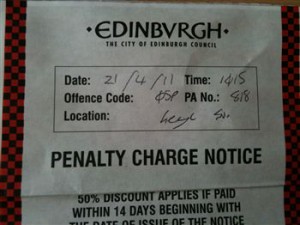
MOTORISTS are four times more likely to be let off a parking ticket in the most lenient area of Scotland compared with the toughest.
Officials in Argyll and Bute rip up an astonishing 83% of parking tickets that are appealed by drivers.
But East Ayrshire has emerged as the most hard-line area of the country when it comes to parking enforcement, only letting off 20% of motorists who challenge their ticket.
There are also big differences in the appeal success rate between Scotland’s two biggest cities. Edinburgh drivers are twice as likely to be let off than those in Glasgow.
The huge discrepancies in parking appeal success rates have been condemned by motoring organisations who said many councils were wrongly slapping thousands of tickets on windscreens.
The figures also suggest that even in the most hard-line areas of Scotland it is still worth challenging parking tickets.
The Freedom of Information Act was used to ask councils how many parking ticket appeals were successful.
Argyll and Bute issued 1,032 tickets last year, of which 169 were appealed. Remarkably, only 29 parking fines were upheld.
East Ayrshire issued a similar number of tickets at 1,096 and a similar proportion were appealed, 143. But the council upheld 114 of the fines.
In Edinburgh, 43% of drivers who challenged their fines were successful at appeal. In Glasgow, the figure was just 24% and in Dundee it was 31%.
There are also discrepancies in appeal rates around Scotland. Drivers in Renfrewshire challenge 26% of tickets and South Lanarkshire is not far behind at 23%. The most apathetic area of Scotland when it comes to parking tickets is Orkney, where only 9% are challenged.
Matthew Sinclair, Director of the TaxPayers’ Alliance, said that the figures show that some councils are giving out tickets when they shouldn’t be.
He said: “It is absolutely stunning that in some councils the success rate for parking appeals is so high, as it suggests that the authority is getting its fines wrong on a massive scale.”
He added: “Too often people will just pay a fine rather than go to the trouble of challenging it, so there is every reason to think this means lots of people have been ripped off with fines inappropriate charges.
Sinclair described Argyll and Bute’s record as “particularly shocking”.
He said: “Councils need to stop exploiting parking fines to get more money out of hard pressed and overtaxed motorists and start working harder to control spending and deliver a better deal for taxpayers.”
Paul Watters, head of roads policy at the AA, said local authorities should be cancelling more tickets, which typically cost £60 or half that if paid within a fortnight.
“It’s one of the few areas where they [the council] make a positive income,” he said.
Watters added: “The problem is that it’s up to the local authority whether or not to cancel the ticket. It really depends on how the council official feels. So some might have harsh attitudes and some relaxed.”
Watters said parking tickets were “a bit of a minor offence”. He said: “If people are taking the trouble to write and give an excuse then let them off. It’s not like going through a red traffic light or driving above the speed limit.”
Barrie Segal, founder of AppealNow.com, said there were two key issues. “First, not enough people appeal,“ he said.
“Second, Edinburgh, according to them, cancels 43% of tickets. If they were a restaurant and poisoned 43% of their customers it wouldn’t be allowed.
“It shows that there is something radically wrong with parking enforcement in Scotland.”
A spokeswoman for Argyll and Bute has admitted that the council are going to make changes to their process. She said: ““This is an unsatisfactory situation and we are working to improve it. There will be changes in this financial year.”
East Ayrshire insisted they were fair rather than hard-line. John McRobert, Roads Operations Manager for the council, said: “Penalty Charge Notices (PCNs) are issued only where clear parking contraventions have occurred and the appeals process is managed in a clear and consistent manner. It is therefore a rare occurrence when a PCN has to be cancelled.”
Edinburgh council said they operated a “first time cancellation” policy. “We will accept an first time appeal if, for example, a pay and display voucher has fallen off the window or if a disabled driver has displayed their blue badge incorrectly,” said a spokesman.
“Of course, in Edinburgh, we welcome a very high number of tourists and foreign visitors each year, which also leads to a high number of cancellations.”
A spokeswoman for Glasgow said: “Everyone has the right to appeal to the council about their Penalty Charge Notice. If they are not happy with the outcome, the next stage is to appeal to the independent adjudicator, The Scottish Parking Appeals Service.”
Several councils declined to give details of parking appeals. Aberdeen City said this was handled by the Scottish Parking Appeals Service.
Several councils, including East Dunbartonshire, Lothian, Highland, East Renfrewshire, Shetland and Inverclyde councils said parking enforcement was the responsibility of local police.
Perth and Kinross and Scottish Borders Council both refused, claiming it would cost too much to give information relating to appeals.
There is no record that Clackmannanshire, North Ayrshire or West Dunbartonshire replied to our request.
